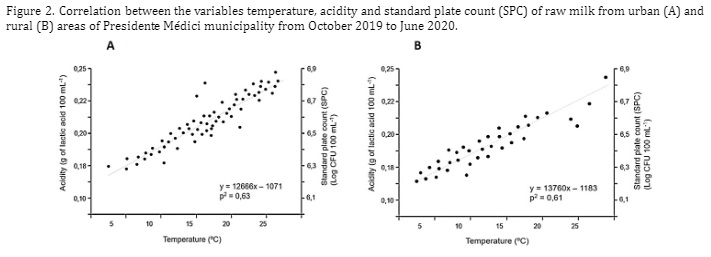Physicochemical and microbiological quality of refrigerated raw bovine milk commercialized in Presidente Médici, Rondônia state, Western Amazon, Brazil
DOI:
https://doi.org/10.21708/avb.2023.17.1.11343Resumo
The aimed was to evaluate the quality of raw milk from some suppliers in rural and urban areas and test the hypothesis that they are not safe for immediate consumption. The study was conducted with suppliers in rural and urban areas in Presidente Médici municipality, Rondônia state. The method of the Ministério da Agricultura, Pecuária e Abastecimento (MAPA), was used, which consists of titrating a portion of the sample with a sodium hydroxide solution of known concentration, using phenolphthalein as an indicator. According to Brazilian legislation and literature, stability of Alizarol, foreign substances, Chloride, Hypochlorite, Hydrogen Peroxide and Colostrum were analyzed. Microbiological analysis, standard plate count (SPC) and quantification of thermotolerant coliforms were also performed using the most probable number (MPN) technique. Values above the limits established by legislation were found, mainly for temperature and titratable acidity, in addition to stability results against Alizarol and the presence of colostrum. There were high microbial contents with regard to SPC, and, in this case, the presence of pathogenic microorganisms cannot be disregarded. The presence of thermotolerant coliforms may indicate probable contact of milk with feces. Therefore, it is considered that the samples analyzed here are not safe for ingestion in the raw form.
Downloads

Downloads
Publicado
Edição
Seção
Licença
Copyright (c) 2023 Acta Veterinaria Brasilica

Este trabalho está licenciado sob uma licença Creative Commons Attribution 4.0 International License.
Autores que publicam na Acta Veterinaria Brasilica concordam com os seguintes termos: a) Autores mantém os direitos autorais e concedem à revista o direito de primeira publicação, com o trabalho simultaneamente licenciado sob a Licença Creative Commons Attribution que permite o compartilhamento do trabalho com reconhecimento da autoria e publicação inicial nesta revista. b) Autores têm autorização para assumir contratos adicionais separadamente, para distribuição não-exclusiva da versão do trabalho publicada nesta revista (ex.: publicar em repositório institucional ou como capítulo de livro), com reconhecimento de autoria e publicação inicial nesta revista. c) Autores têm permissão e são estimulados a publicar e distribuir seu trabalho online (ex.: em repositórios institucionais ou na sua página pessoal) a qualquer ponto antes ou durante o processo editorial, já que isso pode gerar alterações produtivas, bem como aumentar o impacto e a citação do trabalho publicado (Veja O Efeito do Acesso Livre).


 Esta obra está licenciada com uma Licença
Esta obra está licenciada com uma Licença 